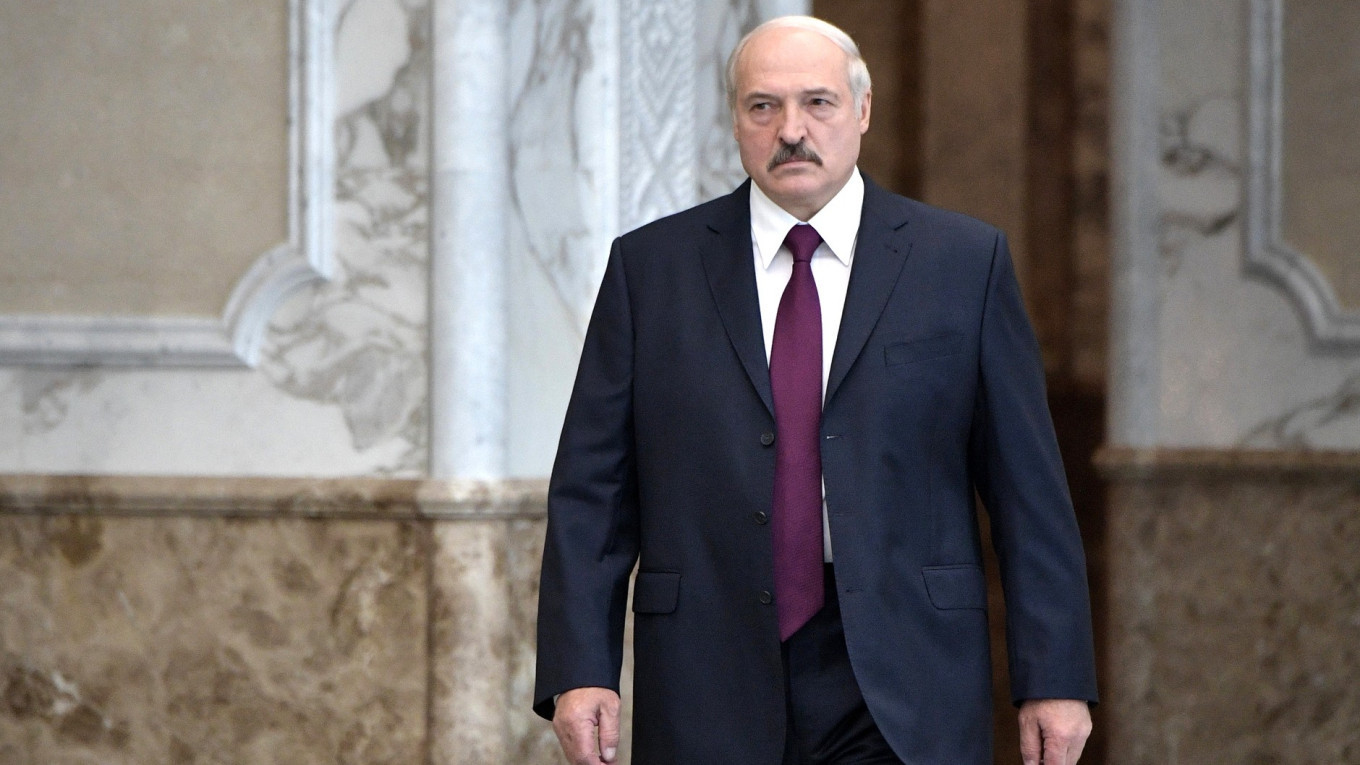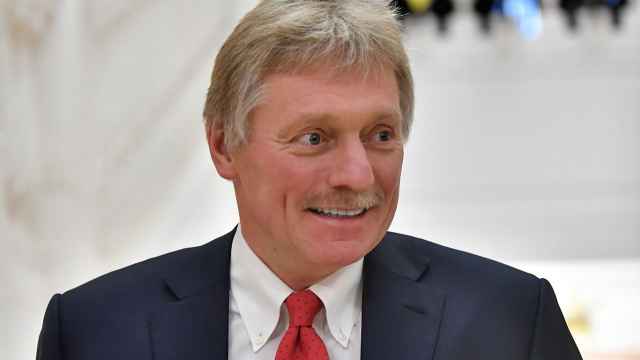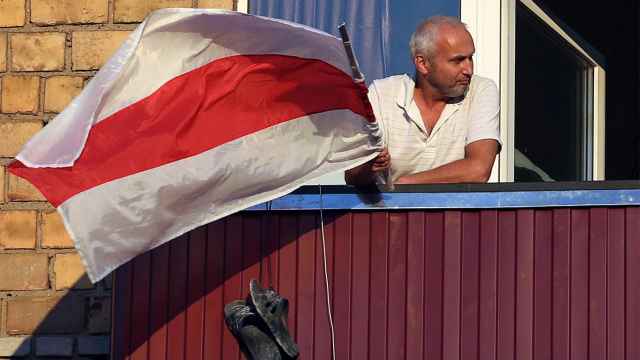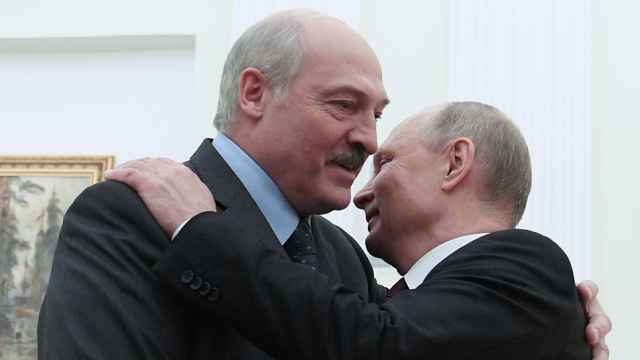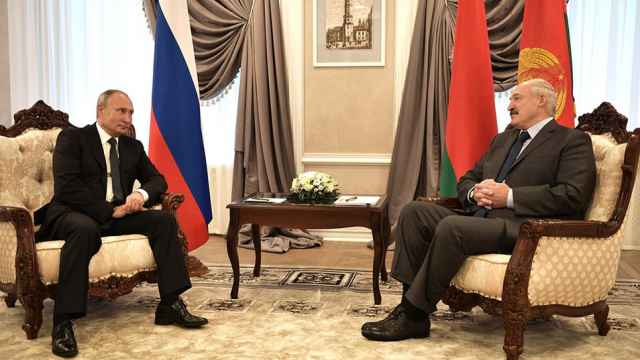In the hours after Belarus shocked the world by forcing a Ryanair plane flying from Athens to Vilnius to land in Minsk and arresting prominent opposition figure Roman Protasevich, officials in Russia — Minsk’s ally and patron — maintained conspicuous radio silence on the events.
Though a string of junior officials praised the action, with RT editor-in-chief Margarita Simonyan saying that Belarusian President Alexander Lukashenko “played it beautifully,” President Vladimir Putin’s spokesman declined to comment and state-run newspapers largely refrained from reporting the incident.
Only in the afternoon of the next day did Russian Foreign Minister Sergei Lavrov say that Belarus had treated the incident with an "absolutely reasonable approach," and call on the global community “to soberly assess the situation.”
Experts on Russian-Belarusian relations say Moscow’s muted reaction speaks to the Kremlin’s ambivalent view of Belarus’s longtime strongman president Alexander Lukashenko, who is at once a beleaguered ally increasingly dependent on Moscow’s goodwill, and a troublesome partner.
“I believe that Lukashenko acted alone, without Russian involvement” said Tatiana Stanovaya, founder of the R.Politik political consultancy, of the forced landing, which European Union officials have referred to as “state terrorism” and “air piracy.”
“However, Russia is Lukashenko’s geopolitical guarantor and will continue protecting him as it has no alternative.”
For Lukashenko, who was elected to the Belarusian presidency in 1994 in the only free and fair elections in the country’s history, relations with his much larger neighbour have always been fraught.
Though elected on a broadly pro-Russian, Soviet nostalgic ticket, exploiting a popular backlash against the post-independence revival of the Belarusian language and culture, Lukashenko has always prioritized his own freedom of maneuver over ties with Moscow.
His relations with his Russian counterparts suffered, as the Belarusian president periodically reached out to the west to strengthen his hand against a Russia keen to deepen its integration with Belarus under the Union State, a framework for an eventual merger between the two countries agreed in 1999.
In 2010, relations between Minsk and Moscow hit an all time low amid squabbles over gas prices and dairy imports. Gazprom-owned TV channel NTV — which is widely watched in Belarus — aired a three-part documentary on Lukashenko, entitled “The Godfather,” implicating the Belarusian president in a series of murders of dissidents in the 1990s.
However, the wave of protests against Lukashenko’s re-election to a sixth term in August 2020, which was widely seen as rigged, changed everything.
An unprecedented outpouring of unrest saw vicious repression unleashed by the Belarusian security forces against demonstrators, with at least four people killed and over 30,000 arrested.
As relations with Europe collapsed and sanctions were imposed, Lukashenko — who had initially blamed Russia for fomenting revolution in Belarus — saw his traditional policy of balancing his two large neighbours against each fatally compromised.
Russia, in contrast, was quick to offer financial and rhetorical support to the stricken Lukashenko, who survived the challenge to his authority but was left heavily dependent on his bigger protector.
“Russia is, to some extent, responsible for Lukashenko’s longevity in power,” said R.Politik’s Stanovaya.
“These events most likely tie him even closer to Russia.”
For some commentators, the Belarusian president’s newfound dependence on Moscow implicates the Kremlin in the arrest of Roman Protasevich.
“Belarus would not have hijacked an EU plane without Russian approval,” tweeted Yale history professor Timothy Snyder, who urged new sanctions against Russia while providing no evidence for his assertion of Moscow’s involvement.
For analysts, the true picture behind the emergency landing — during which Roman Protasevich’s Russian girlfriend, Sofya Sapega, was also detained by Belarusian police, remains murky.
“It’s not impossible that Russia had a role in the incident,” said Artyom Shraibman, the Minsk-based founder of Sense Analytics, a political consultancy.
“But it could easily have worked without Russia.”
However, for the large Belarusian diaspora in Russia — where many Belarusians have sought higher salaries and comparative freedom — there are worries that deepening cooperation between the two sides puts them in new danger.
Since protests erupted in Belarus last August, Russian security forces have been active in apprehending anti-Lukashenko defectors from the country’s law enforcement services who fled to Russia.
In April, Russia’s FSB announced it had foiled a coup plot by two Belarusian opposition figures, who were arrested in Moscow and turned over to Belarus’s KGB internal security service.
“I have become wary of going to Belarus again after this plane case,” said one Belarusian, a former opposition activist who has lived in Russia for several years and insisted on anonymity for fear of reprisals.
“I am probably not high in the list of potential targets. But once the authorities run out of current activists, who knows what they may come up with next.”
Russian skepticism
For R.Politik’s Stanovaya, however, the events at Minsk National Airport on Sunday may yet deepen Russian skepticism for a leader who is now profoundly dependent on Moscow for his survival.
Though Russia is deeply committed to maintaining Belarus within its sphere of influence, it has also endorsed a vague set of proposals for constitutional reform that are theoretically intended to pave the way for a future transfer of power in Minsk.
With the Russian government having recently struck unusually positive notes towards the West ahead of a possible high-stakes summit with US President Biden planned for the summer, Lukashenko’s action may have come as an unwelcome surprise and reinforce doubts about a Belarusian leader long seen in Moscow as erratic.
“The Russian leadership is shocked by this but can’t publicly show it as they have to protect their geopolitical interests,” said Stanovaya. “They see now who they are dealing with.”
“In the Kremlin’s eyes, Lukashenko has become a problem that needs to be addressed.”
A Message from The Moscow Times:
Dear readers,
We are facing unprecedented challenges. Russia's Prosecutor General's Office has designated The Moscow Times as an "undesirable" organization, criminalizing our work and putting our staff at risk of prosecution. This follows our earlier unjust labeling as a "foreign agent."
These actions are direct attempts to silence independent journalism in Russia. The authorities claim our work "discredits the decisions of the Russian leadership." We see things differently: we strive to provide accurate, unbiased reporting on Russia.
We, the journalists of The Moscow Times, refuse to be silenced. But to continue our work, we need your help.
Your support, no matter how small, makes a world of difference. If you can, please support us monthly starting from just $2. It's quick to set up, and every contribution makes a significant impact.
By supporting The Moscow Times, you're defending open, independent journalism in the face of repression. Thank you for standing with us.
Remind me later.



